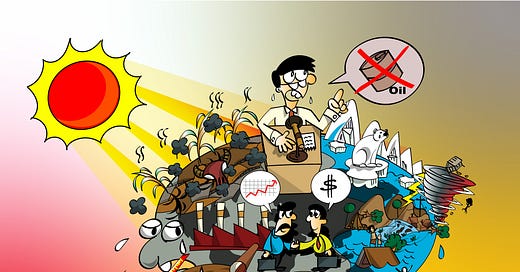'Brutal' heat wave sears Southeast Asia, Earth overload, and bad air days
“So, are you fried, toasted, baked or steamed?” I joked with a friend recently, as we tried to make light of the suffocating, sweltering heat wave that this summer has been.
Conversations hover around ways of managing the heat, be it trying to wear linen or breathable material, best ways to use a mix of electric fans (tip - have one fan oscillating and another stationary, directed and gently blowing light air toward you), and using steel water bottles at home to keep one’s water cool for longer.
At a time of a changing climate (and April 22 was Earth Day), the weather isn’t just small talk - and heat is far from an inconvenience.
A collective sigh of relief rose up when the first rains came in late April here in Bangkok. Still, the temperature reading in the Thai capital exceeded 40 degrees Celsius a few days ago and prior to that, the heat index (heat plus humidity) had hit 52°C. Weather apps warn of ‘dangerous heat’. At one point, a nearby 7-Eleven was covering its ice cream cabinets with cardboard to keep more cold in.
An article I did below was spurred by this relentless heat, which one cannot help but see - and feel - is part of the symptoms of a planet under chronic stress.
We’re now reading that heat records have just been broken in Vietnam (44.2°C on 7 May, highest-ever temperature) Laos, where northern Luang Prabang saw 43.5°C heat and Vientiane, the capital, hit its hottest-ever temperature at 42.5°C as well as in Cambodia (41.7°C on 7 May). “Brutal” is how Accuweather described this “historic” heat wave, saying that temperatures have been rising beyond average historical levels from late March onward. The Thai Meteorological Department reported 40.5°C on 6 May, and 41°C the day after in Bangkok, and other Thai provinces have seen similar or higher temperatures.
Heat stress comes on top of Southeast Asia’s vulnerabilities to disasters and the impact of climate change, and warns of risks to health and life, food security, daily activities and work/play outdoors.
Affecting the Philippines all the way to Thailand, Vietnam, Cambodia and Laos, this heat wave has led to news reports like this on the impact of extreme heat on agriculture and farmers’ incomes – and cartoons such as these by Filipino cartoonist Tarantadong Kalbo (‘Ang hot ko’ translates into ‘I’m so hot’ –but referring to the weather, not attractiveness) and this post by Thailand’s Guru magazine.
See also our infographics and data viz on air pollution and PM2.5 levels in Southeast Asia, which were adding to the stress over the heat. In Bangkok at least, over the past few days, the air quality has been a lot better, or at least not in the red/orange zone in the air quality index. But for weeks on end, the trio of heat, humidity and haze was very much around.
On a cooler note, one of our journalism interns, Meg, reflects about her experience with Reporting Asean and our partner, Probe Media Foundation Inc.
Johanna Son, Reporting Asean editor/founder
1 S is for Sustainability
Beyond the Scorching Heat: Earth Overload, Human Suffering and a Reboot
BY JOHANNA SON
For the third summer in a row, I have relocated my dinner table at home – not for aesthetic or feng shui reasons, but to get some respite from the merciless heat that barges in through the windows and glass panels in my place.
This ‘migration’ was all of 10 footsteps over to the kitchen area, away from the corner where strands of sunlight stream through, daily. But this tiny ritual of adaptation drives home the point that the Thai summer has come to feel more punishing and insistent in the span of just the past few years.
Bad Air Days: Air pollution and PM2.5 levels
Click here for full data viz
Quality of life
2 Other infographics
3 Insight
Reflections on a Journalism Internship: Stuck at Home, but Broadening My Horizons
By MEIGAN RASSEL RODRIGUEZ
There were almost no opportunities for on-site coverage during the COVID-19 pandemic. Aware of how field training is core to nurturing news skills, I was growing more and more doubtful about the development of my journalistic competencies.
4 Clickworthy
Thai Election: Young Candidates Look to Tap Pro-democracy Protest Vote
Opinion polls last week showed that Move Forward is on track to win the second highest number of seats in the House of Representatives, leaving it well placed to partake in a government that could end nine years of military-dominated rule. Thailand’s main opposition party Pheu Thai, led by Paetongtarn Shinawatra, the 36-year-old daughter of former Prime Minister Thaksin, is leading polling. Thais vote on 14 May.











